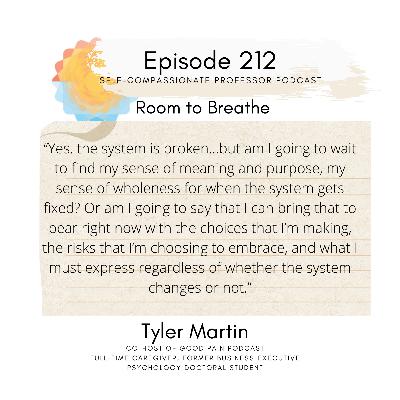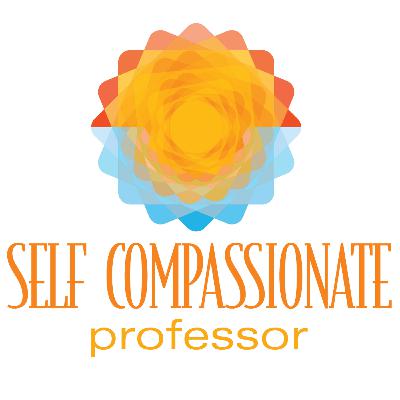Discover Self-Compassionate Professor
Self-Compassionate Professor

200 Episodes
Reverse
In her third appearance on the podcast over a five-year period, Dr. Melanie Peffer tells us about the gifts of the “inverse academic career trajectory” where she moved from tenure-track faculty, to lecturer, and again to adjunct. While from a traditional academic perspective, she explains, this may look like an unsuccessful career. Yet, as her business has grown, she has found great success in entirely unexpected ways:We discuss her new biology textbook coming out in January 2026, her work as a consultant and freelance writer, as well as her love for teaching. She explains that her unconventional career trajectory allows her to set her own benchmarks for success, enjoy her work, take care of and spend time with her family, enjoy her hobbies, and tend to her values and calling. She also discusses identifying with the term, “neuro-spicy,” explaining that while it has its challenges, her unique brain allows her to make observations and connections helpful to carving out her own unique career path. Find Melanie at https://www.biologyeverywhere.com/
Tyler Martin shows that despite institutional demands and limitations placed on higher ed faculty, it is still possible for faculty to feel grounded in purpose, clear about personal values, and strong in their own sense of agency. He argues that as we allow ourselves to experience the tensions we all feel in relationship to our institutions as well as express and co-witness these challenges in community, we can begin to peel back the layers that keep us behaving outside of our integrity. And in this “apprenticeship within conversation,” we find both small and big ways to inch our way back to ourselves. This practice, as Tyler points out, is ongoing and ever-evolving, requiring great commitment to self, community, and society. Find Tyler at https://goodpainco.com/goodpain-podcast/.
Professor of Higher Education, Kevin McClure, talks about his research and writing of the book, The Caring University: Reimagining the Higher Education Workplace after the Great Resignation. A caring university, he explains, prioritizes employees’ experiences, implements humanizing policies and practice, commits to growth and compensation, empowers rights and voice, and realizes equity and belonging. While Kevin explains that the caring university is only a vision, he emphasizes that bits and pieces of this vision live successfully inside the reality of many institutions. In this conversation, Kevin and I talk about his own commitment to care at his own university (as well as the challenges), the “fire” he felt while researching and writing for the book, the interplay between systemic change and individual commitment, and what “the work” of care actually looks like on a daily basis, in his own experience.
Happy Equinox! In this episode, as part of this seasonal celebration, I invite you to go inward and take inventory of your own attachments: how attachment to work (or anything else!) plays out in your life and the ways it may be negatively impacting you and those around you. Namely, I explore the problem of "insecure attachment to work and life" and juxtapose that to "secure attachment to work and life." Through stories and examples, I show what it means to engage with the flow of life and I offer a helpful practice for doing so--a practice, if taken seriously, will result in a calmer and more joyful existence generally.
Dr. Erica McIntyre describes her experiences as an “ADHD’er” academic, her research of Australian academics with ADHD, and neurodivergence in academia more broadly. Erica defines neurodivergence and ADHD, explains how academic institutions could better support neurodivergent academics, and shows how institutional environments more supportive of neurodivergence would support all academics more effectively. We also talk about the individual zone of influence and the importance of creating traction on a small scale so that large-scale movements may be realized. Find Dr. Erica McIntyre on LinkedIn.
Dr. Lennart Nacke describes his academic career as a continual journey toward creating something better: from dealing with depression in his Ph.D. program, to the exciting connections he built in his post-doc work, to the energizing and dynamic work he found on the tenure-track, and now as a full professor who is embarking on a solopreneur path for which he holds great passion. Lennart emphasizes the importance of resilience, building connections, and the process of realignment. Find him on X, LinkedIn, or on his website, https://lennartnacke.com/
Dr. Jen Harrison explains how current higher ed systems often undermine the wellbeing of both graduate students and dissertation supervisors, leaving both feeling unsupported. Jen offers suggestions to faculty supervisors about how to better support themselves and their students: -Set expectations for the what, when, how, and why of communication with your students.-Offer students clear how-to guidelines and templates so they are able to see examples of good research and are clear about expectations. -Make space for students to bring their own unique work style to their research and writing.-Be willing to work with students' unique life circumstances. -Notice and feel when you are rushing your advising conversations, try sinking into a listening stance, and engage in genuine dialogue. --Email Dr. Jen Harrison at jen@readwriteperfect.com.
In this nourishing conversation with therapeutic coach, Henny Flynn, we discuss navigating difficult seasons in career and life, the importance of trusting one's own body, and the healing nature of movement and the natural world. Find Henny Flynn at https://hennyflynn.co.uk/ or on Instagram.
If you are feeling blah in your work, this episode is for you! As we welcome the new season, I invite you to pause so that you can actually FEEL yourself and your relationship to the people and things around you. I build on the concept of a “pausing practice,” which I introduced in Episode 200, where I define pausing as “intentionally doing nothing in particular and letting go of the sense that time is always fixed to an agenda.” I also introduce two other steps to pausing: trusting career wellness and building connections to those places in your work (and life) where you feel disconnected. Happy Solstice! I’m sending a wish that you pause in this seasonal transition.
Dr. Jennifer Costanza shares her journey from perfectionism, imposter syndrome, intense stress, and difficulty healing to feeling an overall sense of mental and physical well-being. She explains the importance of knowing your body’s stress response and emphasizes how making time to focus on your physical and mental health—finding ways to feel grounded, getting quality sleep, finding joy, etc.—makes you better at your job. Find Jennifer Costanza at https://www.rooted.life/ or @rooted.life on Instagram.
Dr. LuElla D’Amico describes how her own suffering during the tenure process opened up a whole new joyful adventure where she now shows up more fully for her family, her faith, her teaching, her university, her scholarship, her communities, and her own well-being. She offers inspiration, encouragement, and advice for academics who also aspire to be more whole.
Dr. Victoria Wright shares her own story about leaving academia as a full professor. She now finds herself running the Ph.D. Life Coach Podcast and membership experience, helping PhD students and academics overcome overwhelm and procrastination. This work, as she explains, represents the culmination of having weaved together her research, skills she developed working with Ph.D. students, and the personal calling she answered during the pandemic. Find her podcast, The PhD Life Coach, anywhere you get podcasts as well as on her website at https://www.thephdlifecoach.com/.
This episode is not an interview, but a chat about the experiences of the Highly Sensitive Person, a designation perhaps overrepresented in academia. Drs. Geneviève Taylor and Danielle De La Mare discuss what it looks and feels like to process everything deeply, get overstimulated easily, feel emotions intensely, and notice the subtler parts of life. We also explore both the gifts and drawbacks of having a sensitive nervous system and ways we practice self-acceptance and self-compassion.
Our pausing practice is perhaps the most important part of creating more career wellness in our work, yet we don't have a social structure that supports pausing. In this episode, I discuss ways you might begin to think about pausing, how to structure an ongoing pausing practice, and the benefits of pausing for career wellness. During this seasonal transition, I hope you pause, detox, and declutter. Happy Equinox!
Kelly Miller tells the story about how her identity was deeply entangled with her work, the toxic work environment she found herself in, the suffering that ensued when she left the work, and the breakthrough that happened next.
Kelly explains that her faith as well as her work with both the Enneagram and Primal Questions built a foundation for her to leap into the next chapter of her career. While she continues to heal, Kelly now actively leans into new places, people, and ideas that serve her new way of being in the world.
Find Kelly Miller at https://www.kellymiller.co/ as well as @socialkellymiller on Instagram and TikTok and Kelly Miller on LinkedIn.
Paul Weigel talks about what it means to be authentic, true, and connected in both work and personal life. We explore what it looks like to make space for ourselves as well as others in the classroom and in other spaces. We also talk about the courage it takes to show up authentically, be present to deeper meaning in each moment, and hold work/life gently. Find Paul’s book, Iron Dad here.
Dr. Mary Mirvis discusses how her unconventional academic career is taking shape and her faith in the journey. First, we talk about writing: the huge role writing has played in her life since childhood, how she used writing to heal from burnout, and how journal-type writing has strengthened the relationship she has to her research. Second, we talk about the purposeful career: finding joy, openness, and freedom in the everyday as well as leaning into your career desires, even when they’re not culturally sanctioned. Find Mary at https://mary.mirv.is/.
Dr. Shiri Noy explains how creating systems to manage research is essential to individual researcher well-being as well as a necessary practice for maintaining the health and integrity of academic research more broadly. In short, Shiri encourages researchers to think and talk more about project management so that we can find ways to feel more confident and less stressed in our research, do work that is best aligned to our values and ethics, as well as maintain/improve the health of our broader disciplinary fields and institutions. Find Dr. Shiri Noy as well as information about her book, Project Management for Researchers: A Practical, Stress-Free Guide to Getting Organized, at https://www.shirinoy.com/.
Happy Solstice! In this episode, I discuss what mean by solstice-inspired rest, why you should rest over the winter break, how to rest, and what to do if you find rest difficult. Overall, rest can do magic, but takes courage, especially for academics. I have a wish that you practice trusting the process.
Dissertation coach, Dr. Jen Harrison, explains how certain cultural and structural issues prevent professors and institutions from fully supporting their grad students in their writing process. She names a number of issues including an "inside-outside" problem whereby academia does not want to accept help from those outside institutions. In the end, both grad students and professors find themselves bearing the weight of such problems, but Jen offers recommendations to improve conditions for all. Specifically, she discusses the power of writing groups. Find Dr. Jen Harrison at https://www.linkedin.com/in/jennifer-harrison-rwp/.








people actually got a spring break?